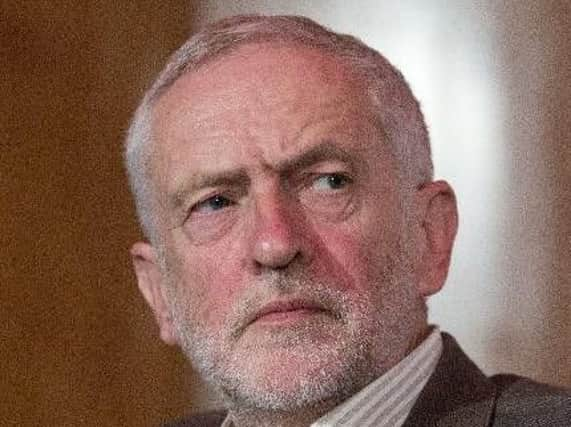Corbyn again declines to specifically denounce IRA as terrorists


The Labour leader spoke after Northern Ireland Secretary James Brokenshire accused him of having "IRA sympathies" and urged him to make clear whether he believes the group were terrorists and if their actions should be "unequivocally" condemned.
Mr Corbyn has come under fire for refusing to single out the IRA for condemnation when pressed over his past campaigning activities, and he again refused to mention them specifically.
Advertisement
Hide AdAdvertisement
Hide AdMr Brokenshire's questions were put to Mr Corbyn by a reporter after the Labour leader gave a speech in Hull.
Mr Corbyn said: "I condemn all acts of violence in Northern Ireland from wherever they came.
"I spent the whole of the 1980s representing a constituency with a large number of Irish people in it, we wanted peace, we wanted justice, we wanted a solution.
"The ceasefire, the first ceasefire, helped to bring that about, and bring about those talks, which were representative of all sections of opinion in Northern Ireland."
Advertisement
Hide AdAdvertisement
Hide AdThe Labour government after 1997 helped to bring in the historic Good Friday Agreement, the basis of which was the recognition of the differing cultural histories and values of Northern Ireland, and it stood the test of time and it's still there, he added.
"We have devolved administration in Northern Ireland and I think we should recognise that that peace was achieved by a lot of bravery, both in the unionist community as well as in the nationalist community - people that walked a very difficult extra mile when they were under pressure from their communities not to do so - both republicans and unionists walked that extra mile and brought us the Good Friday Agreement.
"And I think we should use this election as thanking those that brought about the Good Friday Agreement."
Mr Corbyn and shadow chancellor John McDonnell have faced scrutiny over their association with Irish republicans.
Advertisement
Hide AdAdvertisement
Hide AdBefore the IRA ceasefire, they controversially met Sinn Fein a number of times in Westminster during the 1990s.
The row over the pair's past activities has prompted the intervention of Gerry Adams and Bertie Ahern, both highly significant figures in the era.
Sinn Fein president Mr Adams said Mr Corbyn was "on the right side of history" in supporting Irish republicans and had respected the party's democratic mandate.
"What he did was very modest, what he did was very fundamental," Mr Adams said.
Advertisement
Hide AdAdvertisement
Hide AdFormer Irish premier Mr Ahern, who worked with former prime minister Tony Blair and Northern Ireland politicians to secure the 1998 Good Friday Agreement - which largely ended 30 years of trouble in Northern Ireland - warned against digging up "any of the enmities, animosities of the past".
The retired Dublin politician told ITV's Good Morning Britain programme: "Of course we all condemn the violence of all sides in the past and we want to move on.
"Jeremy Corbyn, I think, always kept the door open to Sinn Fein during those difficult days, but we want to get away from the violence of the past and hopefully that never returns."
Mr McDonnell has apologised for comments he made praising the IRA's "bravery" in 2003.
Advertisement
Hide AdAdvertisement
Hide AdAfter becoming Labour leader in 2015, Mr Corbyn defended reaching out to republicans during the Troubles - insisting he wanted the violence to stop.
But Mr Brokenshire said: "I have listened with interest and concern to the various attempts by Jeremy Corbyn and John McDonnell to explain their attitudes towards IRA terrorism during the 1980s and 1990s.
"Their complete failure unequivocally to condemn terrorism, and to attempt to contextualise it, are deeply worrying coming from two people who in just over two weeks seek to be entrusted with the security of the United Kingdom."